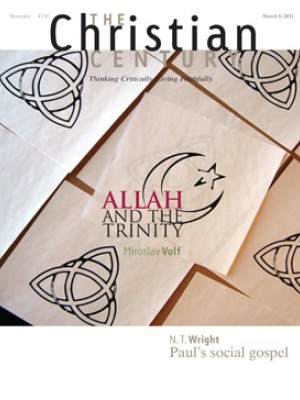Bringing guns to church
The way pastor Jonathan Wilkins sees it, members of his Baptist
church in Thomaston, Georgia, should have the right to carry guns into
worship services to protect the congregation. Wilkins's Baptist
Tabernacle and a Georgia gun-rights association are challenging a new
state law that prohibits weapons in houses of worship. A lower court
ruled against them in January; the case is headed for appeal.
"What
we're fighting for is not that just any old body can carry guns in
church," Wilkins said. "We would be responsible. We would want people
who are trained, and so forth, to carry, people that we designate for
protective purposes."
Recently, state legislatures in Georgia,
Michigan and Louisiana have been caught in the debate over gun rights
and gun control as they consider allowing weapons in houses of worship.
Though
gun-rights proponents think they have both the First and Second
Amendments on their side, they also cite the rights of religious
organizations as property owners. Opponents, meanwhile, worry that
having weapons in worship is a step on a slippery slope to permitting
them everywhere.
Read our latest issue or browse back issues.
A month after then-Georgia governor Sonny Perdue
signed the 2010 law listing places of worship among "unauthorized"
locations for carrying weapons, Governor Bobby Jindal of Louisiana took
the opposite tack. Louisiana law now permits trained worshipers to
bring guns into churches, mosques and synagogues as long as fellow
congregants are informed.
Meanwhile, other states are mulling whether to scale back restrictions on weapons.
In
Michigan, gun rights activists are pushing for a change in the law that
would make it possible to carry guns in worship services without prior
permission from a presiding official.
Mike Thiede, spokesman for
Michigan Gun Owners and a member of a Baptist church, said he spoke to
legislators in favor of changing the law after a church secretary was
assaulted and a pastor was tied up during a robbery at another church.
"I just thought it was a terrible situation for people to be in," he
said. "Outside that door, they could protect themselves, but inside that
door, they could be a victim."
Other crimes have prompted greater
interest in new legislation. In 2009 alone, abortion doctor and usher
George Tiller was shot in the foyer of his Lutheran church in Kansas;
Fred Winters was killed in his Illinois pulpit; and another minister,
Carol Daniels, was found dead in her Oklahoma church.
"When you
see things like that happening over and over again, churches are saying,
'What are we supposed to do?"' said Jeffrey Hawkins, executive director
of the Virginia-based Christian Security Network.
Hawkins's
organization reported seven homicides in churches in 2010, but while he
supports crime-prevention techniques, Hawkins does not advocate allowing
worshipers to carry guns into church. "You go into somewhere crowded,
like a church, and there's three people who have guns out that are
shooting at each other," he said. "How's the police officer going to be
able to discern who's . . . the bad guy?"
Laura Cutilletta, senior
staff attorney of the San Francisco-based Legal Community Against
Violence, said many states remain silent on weapons and worship. But she
went on to say gun lobbyists have become more vocal advocates for
permitting weapons not only in churches but in other public places, such
as parking lots and bars.
"Guns don't have a place in public,
especially places like churches and bars and places where a lot of
people are congregating," she said. "An unintentional shooting could end
up injuring many people."
Laws about weapons in houses of worship
vary widely. Some states forbid firearms in religious buildings, but
others permit them unless a congregation has posted a sign disallowing
them. Still others say they're permitted if the pastor, priest or rabbi
gives the OK. And the penalties are just as varied, with some "like a
traffic ticket" and other violations considered a felony, Hawkins said.
In
Virginia, carrying a gun in a house of worship is allowed unless a
service is being conducted. If there is a service, "good and sufficient
reason"—a term left undefined in the code—is required. "We think our law
is actually broad enough that there's no great urgency to try to change
it," said Philip Van Cleave, president of the Virginia Citizens Defense
League, a gun-rights group.
In Mississippi, several bills that
were introduced to remove churches from a list of prohibited places for
weapons died in committee, but at least one bill continues to be
debated. "It seems to me that our law that explicitly prohibits acts in a
church that are perfectly legal outside the church clearly violates the
First Amendment in addition to the Second," said Jeff Pittman, vice
president of the Mississippi State Firearm Owners Association.






